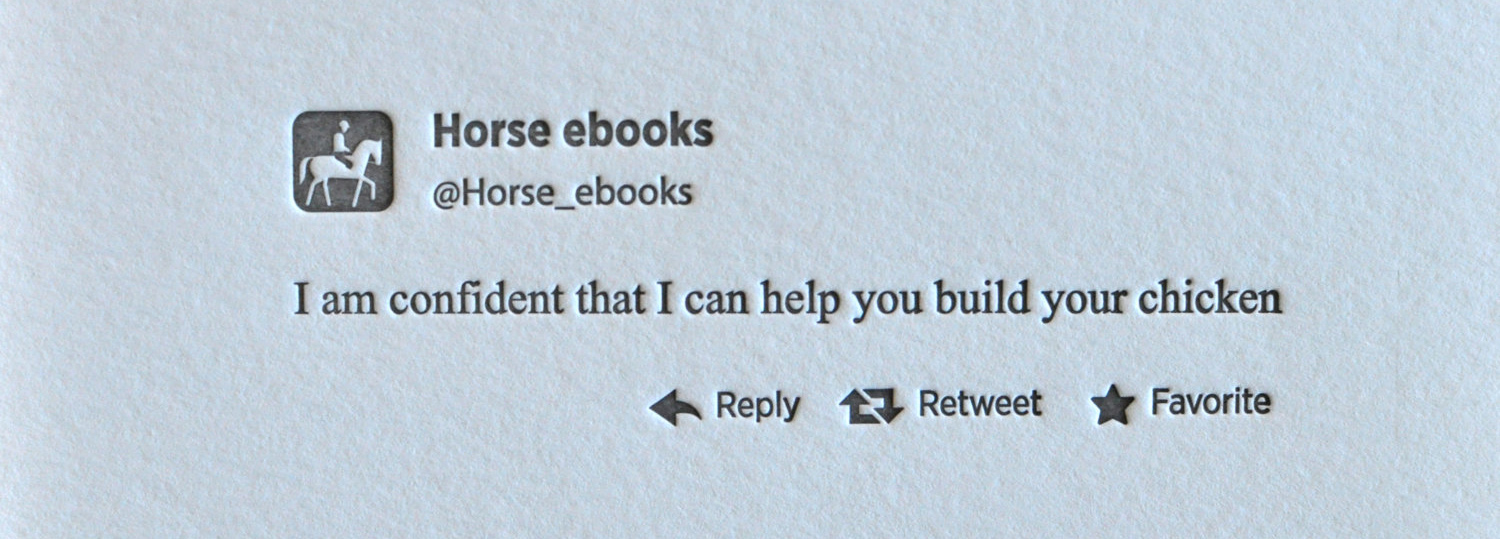
In a world where Twitter inhabitants connect with their friends, share their daily lives and identities with the general public, @horse_ebooks offered a beautiful and bewildering glimpse at the heart of the internet. It was a text bot with over 200,000 followers. The account, unquestionably an international phenomenon, transcended the boundaries of memetics and spontaneous retweets into the realm of worldwide discourse, even making appearances in academic publications. It questioned at the universe like most people gaze up at the stars while simultaneously demonstrating an absolute lack of humanity.
Almost equally mystifying was Pronunciationbook, the YouTube channel responsible for such clips as “How to Pronounce Gnocchi”, “How to Pronounce Ke$ha”, and “How to Pronounce Acai”. For nearly three years, the channel seemingly plucked words from random from dictionaries and across the Web, hitting on a strange side of popular culture by, oddly enough, providing standard English pronunciations. All appeared mundane, if not a bit inhuman, until the channel released a video simply entitled “How to Pronounce 77”.
In one of the greatest revelations to which the internet has ever borne witness, Jacob Bakkila, creative director at Buzzfeed, and Thomas Bender, formerly vice-president of product development at Howcast, have stepped out of the shadows to reveal the fruits of nearly three years of work. When did this happen? The two most bizarre fusions of human insight and mechanical constraint ever released upon Earth were not, in fact, products of a mysterious and ever-evolving Internet, but the workings of a couple of guys who asked the most brilliant and relevant existential question of our times: how do we distinguish computer from human.
The answer is harder to arrive at than we once may have thought; anonymity in writing is far easier to come by in the modern age than ever before. Physicality has become a non-essential quality of things in our world, reflected in our increasingly apparent lack of understanding of the real impacts of the internet. This uncomfortable unknown is what led tens of thousands of people worldwide to presume that @horse_ebooks was nothing more than an automated piece of script trawling the web for random snippets of text, that its philosophical ramblings were the miraculous products of chance and interconnectivity of communication.
Turing Test be damned; @horse_ebooks has proven more of a threat to the tangibility of humanity than any supercomputer AI. That’s the remarkable elegance of the project: dredging up the thematic core of sci-fi works from Asimov’s novels to The Matrix, shouting to the universe that something just doesn’t make sense. The very notion of machines challenging our cognitive superiority and human spirit makes us very uncomfortable. Inverting this fear forms the basis for Bakkila and Bender’s pieces, which ask us if we can distinguish computer-like speech from something actually generated by a computer, a sort of reverse-Turing Test. As it turns out, humans are exceptional at masquerading as machines attempting to be human.
PronunciationBook factors smoothly into this examination by stabbing at the universal desire to find patterns in chaos. Though the esoteric YouTube channel never received the same sort of ontological attention as @horse_ebooks due to its usage of a distinctly human voice, it nonetheless built a massive following of investigators determined to uncork its bottle of mysteries. A firestorm brewed with the release of the aforementioned countdown videos, beginning with “How to Pronounce 77”’s chilling proclamation that “Something is going to happen in 77 days”, followed up by the downright disturbing pronunciation of 76, which stated that “I have been trying to tell you something for 1183 days. Something is going to happen in 76 days.” Whereas @horse_ebooks didn’t fully attempt to reach humanity, PronunciationBook reflected a fusion of man and machine, the voice of a person passing on the ramblings of a random text generator.
Throughout the several-month-long countdown, PronunciationBook rapidly transitioned from these brief apocalyptic prophecies to phrases of nonsense, then to several-minutes-long narratives about intertwining character arcs and surrealist events, and finally to an unsettling weeks-spanning sonnet which waxed romantic about systems. The so-called 77 Days community online speculated about terrorist attacks, political uprisings, plots of war in the Middle East, religious movements, and a whole lot more.
Adding to the mystery, the last 20 seconds of each video culminated in a quiet orchestra of machine noise. 77 Days’ army of tech-savvy investigators developed an algorithm that decoded the whirring to produce an image. Growing day-by-day, the resultant spectrogram horrifyingly built up to a figure in a suit.
After almost three years of waiting, PronunciationBook released a video entitled “How to Pronounce horse_ebooks”, and Bakkila and Bender acknowledged the accounts as conceptual art pieces. The video further complicated matters by revealing the pieces as viral marketing for Bakkila and Bender’s upcoming choose-your-own-adventure game, Bear Sterns Bravo. While this felt like a mundane result, Bear Sterns Bravo continues the pair’s investigation into systems and modern paradoxes. The disturbing figure from the spectrogram was eventually revealed as the antagonist of Bear Sterns Bravo, Bear Sterns CEO Jackie Dalton. Dalton constantly wears a stock ticker in front of his eyes, becoming one with his capitalistic machine.
Reactions to the reveal were, needless to say, diverse. Everything from unrestrained outrage to bewilderment and assenting claims that the connection was somehow obvious the whole time burst forth from all corners of the internet and major publications like the New Yorker. Chief among the choruses of questions and thoughts about the two projects was, strangely enough, a classical one: were the two accounts “real” art?
The avant-garde has consistently been deemed trivial and worthless by contemporaries, only to be hailed by historians as unappreciated brilliance. Whether these works will end up being enshrined in the pantheon of artistic advancements remains to be seen, but their contemporary value as art, in my eyes, is incredibly strong. Even if the only thing @horse_ebooks ever did was make a reader chuckle, and all PronuncationBook managed to do was spawn an even more notable parody account, PronunciationManual, both projects captured an element of the zeitgeist of the 2010s. Somehow, the mad ramblings of both masked men hit just the right notes in just the right way as to make it all mean something. Even if they angered you, they angered you for a reason.
The most shocking truth that the project revealed is more deeply unsettling than anything the accounts ever released: the answer to our first question, how we go about distinguishing computer from human, might be completely irrelevant. “Everything happens so much” doesn’t need to come from either man or a machine to be such a uniquely thoughtful 26 characters.

Sean Stempler is a rising Junior and an English and Journalism student at Georgetown University. He is Managing Editor for the Georgetown Independent, as well as a staff writer and editor on other publications like the Anthem and Georgetown Radio’s The Rotation. In his spare time, he freelances for several online publications, including recent work for Game Cupid. His work is collected in an online portfolio, seanstempler.wordpress.com.
This article is a finalist in the 2014 DC Student Arts Journalism Challenge, an annual competition designed to identify and support talented young arts writers.
The one sentence, “…humans are exceptional at masquerading as machines attempting to be human.” seemed, to me, to sum up so many thoughts. Thank you.